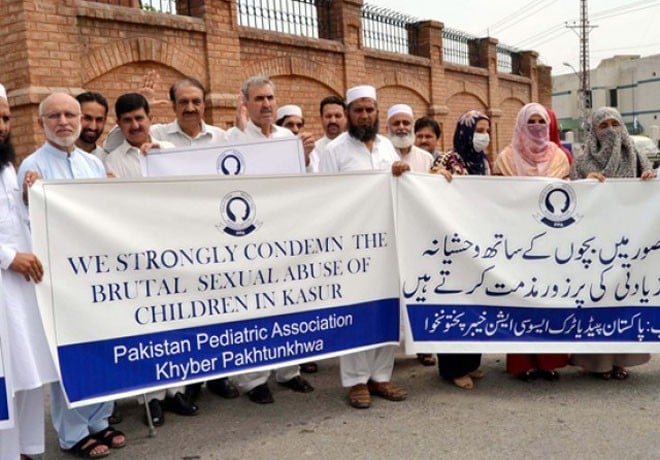
According to a survey report, 42 cases of child abuse happened in Khyber Pakhtunkhwa from January to June 2017

As seven-year old Zainab became the focus of attention after her rape and brutal murder, the story of Asma aged four wasn’t noticed much even though she met a similar fate.
These incidents happened in two smaller cities in different provinces but the brutality was alike and the pain caused was no different. However, the reaction wasn’t the same as Zainab’s case in Kasur in Punjab surfaced earlier and was widely reported. In comparison, Asma’s case in Mardan in Khyber Pakhtunkhwa belatedly came into notice and the media, politicians and civil society took time to pay attention to it.
Asma, hailing from Jhandar Par locality in Gujar Garhi village sited near Mardan city, went missing on January 13 and her body was recovered a day later from a sugarcane field. Though the Inspector General of Police, Khyber Pakhtunkhwa, Salahuddin Khan Mahsud, claimed the police and local people together searched and found the body, some villagers said they recovered and shifted it to her house.
Asma’s family is said to be poor. Her father Behram Khan is working as a labourer in Saudi Arabia and was abroad at the time of the incident. In numerous such cases all over Pakistan, particularly in Khyber Pakhtunkhwa and Fata from where an unusually big number of men have gone abroad or travelled to places like Karachi in search of livelihood, social problems have arisen.
In absence of the family’s male head and breadwinner, the wife and other female members assume the responsibility for running the household. In Asma’s case as well, the presence of her father would have provided her family relatively better protection and intimidated the rapist/killer. In case of Zainab also, the rapist/killer struck when her parents were in Saudi Arabia to perform Umrah. Besides, the rapists invariably try to kill their prey when they realise the victim has recognised them. And in most cases, a relative or neighbour would have committed the crime and would be known to the victim.
Asma has gone and the killer is still at large. The police are under tremendous pressure to track him down. The senior cops would continue to face criticism until this case is worked out. Initially, the police officials were reluctant to concede that Asma has been sexually assaulted. IGP Salahuddin Mahsud subsequently admitted that the medico-legal report had confirmed she had been sexually abused. He said the samples from her body had been sent for forensic examination to Lahore as certain aspects weren’t clear in the initial report.
Read also: The story of Zainab’s hometown
His admission disarmed critics, particularly those from the opposition parties, such as the ANP, PML-N and JUI-F, who had accused the police of a cover-up to save the reputation of the ruling PTI which had been claiming that its decision to depoliticise the police had significantly improved its performance in the province.
Since Asma’s death, politicians have been flocking to Asma’s house to offer condolences to her family and also do some point-scoring. Local and provincial leaders of almost all parties have been there and talked to the crews of television channels waiting for them to seek their comments. The opposition politicians are blaming the PTI-led provincial government for its inability to prevent such horrible incidents and for making false claims about improvement in police performance.
As Chief Minister Pervez Khattak and his ministers were criticised for failing to visit Gujar Garhi to meet the victim’s family, he paid a visit on January 18 in the company of some of his party’s ministers and lawmakers to offer his condolences, promise justice to the grieving family members and assure them payment of financial assistance. It was obvious the issue had been politicised and would continue to draw attention until the killer was brought to justice.
While Asma’s case is still unresolved, another incident of child abuse has been reported from Khushmuqam in Akbarpura village in Nowshera, the home district of Chief Minister Pervez Khattak. In this incident though, villagers are claiming to have got hold of the accused who was trying to abuse a girl aged two years and four months in a vacant house. The villagers were alerted by the girl’s cries and the man was caught before he could molest her. He was thrashed and then handed over to the police.
These weren’t the only cases of child abuse in the province. According to a survey report of Sahil, an NGO, 42 cases of child abuse happened in Khyber Pakhtunkhwa from January to June 2017. Though the figures were the lowest among the four provinces, this was still a cause for alarm as rape and child abuse cases in Khyber Pakhtunkhwa have been rare in the past.
Some of these cases were widely reported, including the rape and murder of six-year old Shabnoor belonging to Sadaat Baba in Lundkhwar, also located in Mardan about a year ago. Another incident that was reported nationwide concerned Sharifan Bibi, a young girl who was paraded naked in a village in Dera Ismail Khan.
The PTI government would have to do better as it raised expectations by repeatedly claiming that the depoliticised Khyber Pakhtunkhwa police had become the most professional police force in the country.